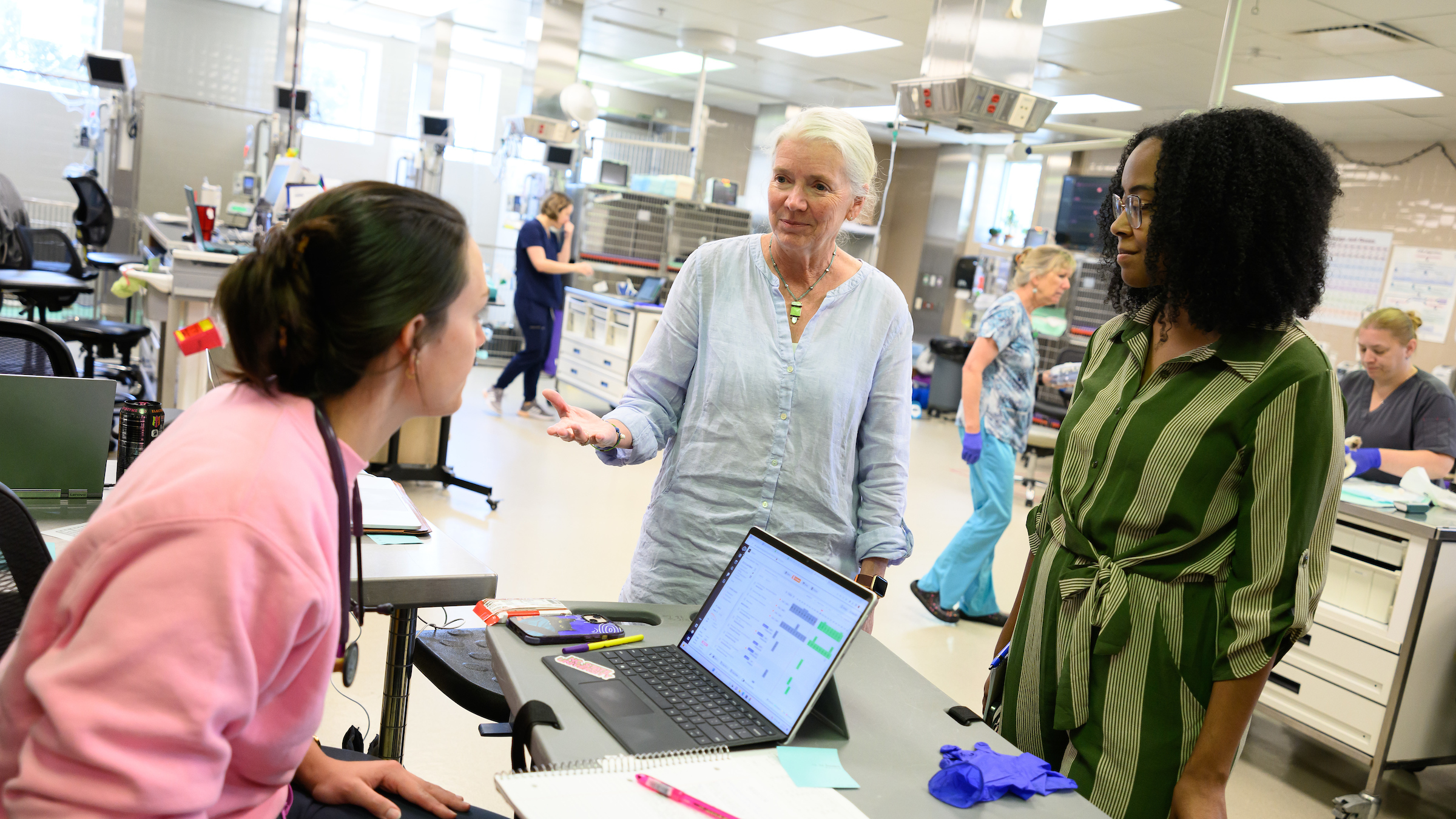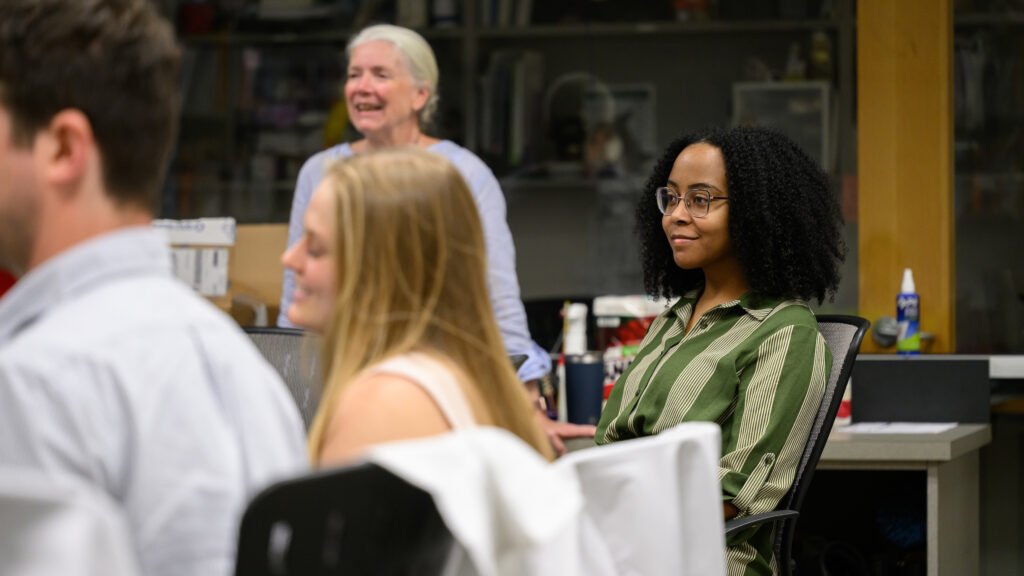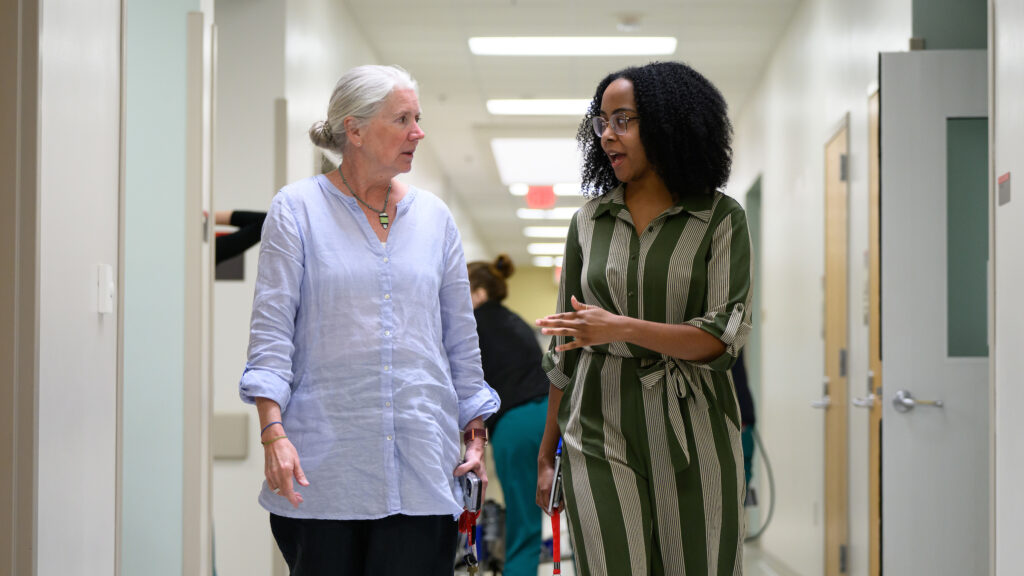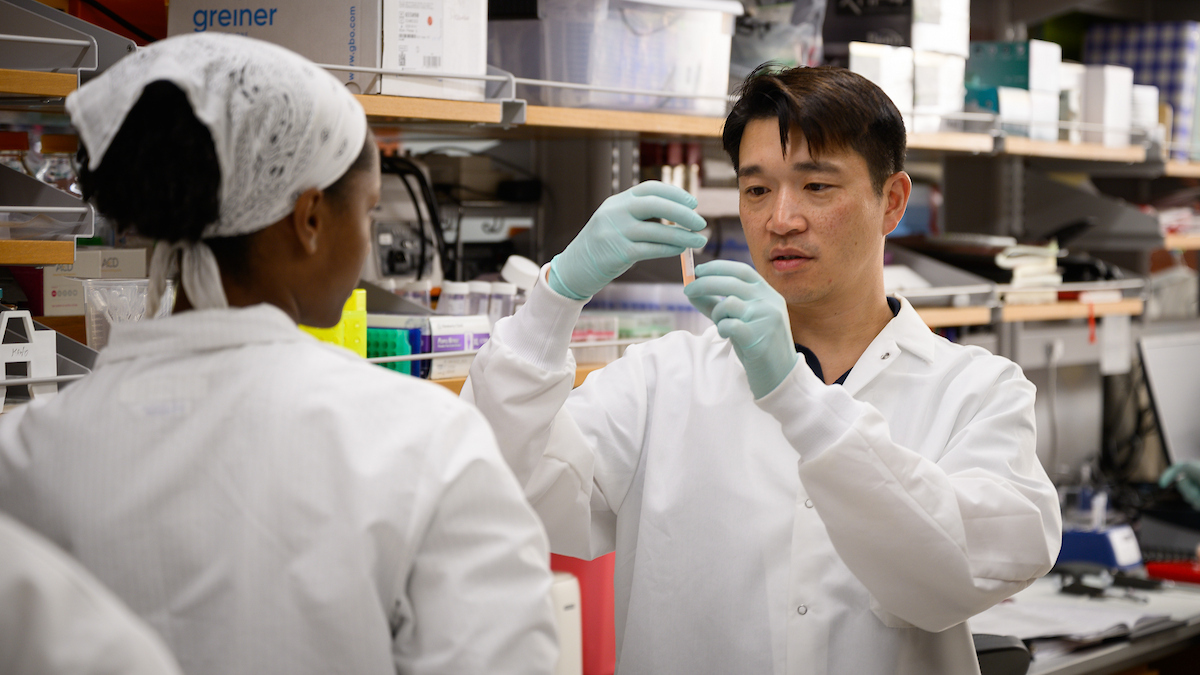At NC State Veterinary Hospital, Clinical Social Workers Offer Comfort to Caregivers
One of the newest members of the NC State CVM family, Morgan Josey, joins clinical social worker Rebecca Maher in providing emotional support for animal lovers across the hospital.

It’s 9 a.m. in the internal medicine area of the Terry Center, and clinical social workers Rebecca Maher and Morgan Josey have performed a minor miracle: getting tired fourth-year students to participate in a group mindfulness activity during clinical rounds.
“I’m not good at self-care,” one student volunteers as the group discusses what they do to decompress from long days in the clinic.
“This is a no-judgment zone,” Maher gently responds. “As the year goes on, I hope you start thinking about things you can do for yourself.”
This is an example of what Maher calls “teaching in the moment,” part of her and Josey’s day-to-day work reminding veterinary caregivers how to care for themselves and become better advocates for patients who express their needs with whimpers and whinnies.
Their team, Family and Community Services, also supports owners and community partners whose animals are receiving treatment at the NC State Veterinary Hospital. Josey and Maher help them navigate the hospital system, approach treatment decisions and honor departed companions of all shapes and sizes.
The NC State College of Veterinary Medicine was one of the first veterinary schools in the country to embed social workers within its hospital team. Josey joined the service in August, enhancing the hospital’s ability to support people who love their animals at every stage of care.
“The Family and Community Services team really helps us focus on the entire family,” says Dr. Kate Meurs, dean of the NC State College of Veterinary Medicine. “We care deeply about providing the very best medical care to all of our patients, but this team ensures that we are also addressing concerns and needs of the families who love them. This is a critical part of our entire medical approach and our educational mission.”

Maher and Josey typically begin and end their days conducting rounds within the hospital’s different services to check in on patients and care teams. In between, they field calls from people whose pets are in the hospital and counsel them through their animals’ treatment options, offering comfort to those whose pets have complex or terminal diagnoses. They also console owners, students and faculty when patients pass away and help shepherd them through the grieving process.
They balance these tasks on schedules that can shift at a moment’s notice, as they often respond to patient or caregiver emergencies, too. Maher also serves on the Veterinary Hospital’s ethics committee.
Josey, from Knightdale, North Carolina, earned her bachelor’s degree in human development and family studies from the University of North Carolina at Greensboro and her Master of Social Work from North Carolina Central University. She worked with patients receiving gender-affirming care in Duke Health’s endocrinology service for over two years before joining the NC State CVM.
“Everybody’s been pretty welcoming here,” she says, recounting how she was invited to shadow a surgeon into a procedure on her second day. “That was a lot! I enjoy being invited into these spaces so graciously — even if it is surgery.”
Maher has worked at the CVM for four years. She now calls Durham home, but she grew up around Europe and the United States, earning her bachelor’s degree in biological anthropology at Harvard University.
A stint working in vocational rehabilitation for adults with serious and persistent mental illness brought her into social work, and she earned her Master of Social Work at the University of North Carolina at Chapel Hill. She also worked in Duke Health’s endocrinology service, and she spent over 30 years in various positions within that hospital system, including in newborn and pediatric intensive care units, administration and ethics clinical consulting.
Josey and Maher say their backgrounds in human medicine translate well to veterinary medicine, from knowing terminology to understanding how families make care decisions.
But Josey says her new job still comes with surprises unique to vet med.
“There are so many different types of companion animals,” she says. “I knew there were more than just cats and dogs, but the other day there was an emotional support chicken. I would have never known that was an option!”
Working at a teaching hospital also gives Josey and Maher the opportunity to help shape a compassionate learning environment for residents and students. Every day, they work to equip care teams with the tools to approach difficult situations and celebrate their accomplishments.
And every day they learn something in return. Maher describes herself as a “gatherer of tales.”
“I love the idea of being able to accompany people on journeys, learn from them and be able to offer what I’ve learned as a gift to the next person,” she says. “Many times I will say, ‘Another client shared this with me. I don’t know if it will be interesting to you, I am not the expert on who you are, but I am kind of the gatherer of tales, and let’s see if some of them could be helpful.’”
One such tale features a woman who told Maher that her dog helped her open up emotionally, which enabled her to meet her husband. Another dog owner said walking his pet in public helped him overcome acute shyness.
“I go home very moved by the variety of ways that people co-create spaces with animals and what the benefit is to a person,” Maher says. “A lot of my work with clients is helping them articulate that space and those gifts.”
Josey and Maher fondly recall the animals that have touched their own lives. Josey grew up with a boxer, Mace, who passed away late last year as she was applying to jobs. She jokes that her finding the NC State position was a sign from him. Maher has owned cats, dogs, hamsters, hermit crabs and a tree frog, and she now shares her home with a black goldendoodle called Tinker Bear and a Birman cat named Boo Radley.
Maher’s admiration of the animal kingdom is apparent in her office. A menagerie of creatures appear in photos, figurines and books surrounding comfortable furniture in the room’s soft lighting, in a conscious effort by Maher to make sure everyone who enters can find their favorite animal represented.
In fact, her space in the Terry Center is instantly recognizable to passersby, even with the door closed. Various tea tins line the window ledge so faculty, residents, students and visitors can help themselves to a comforting cup around the clock.
Josey is still getting settled into her office in the Health and Wellness Center, but she is eager to meet the CVM community and guide its members through the challenges and successes of life at a veterinary hospital.
“This whole thing has been a learning experience, and I’m excited to keep learning and grateful to contribute to such a supportive environment,” she says.

- Categories:


